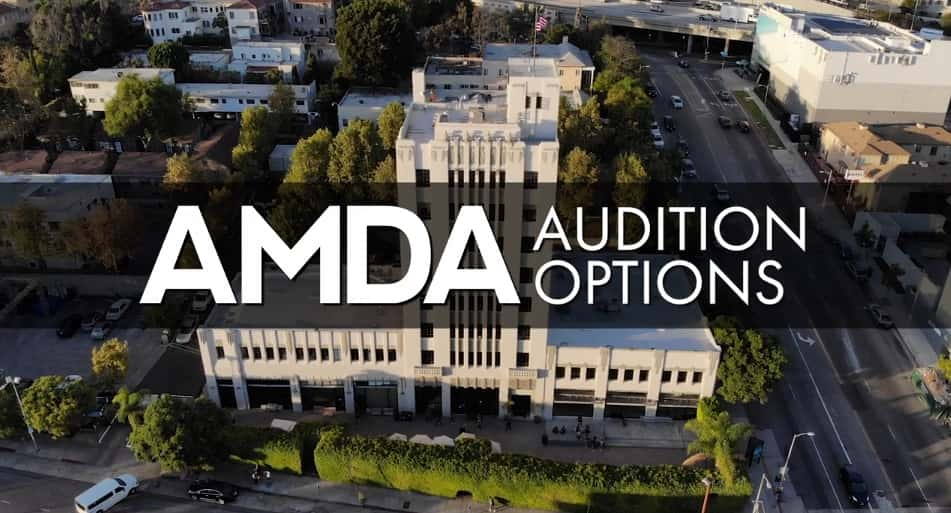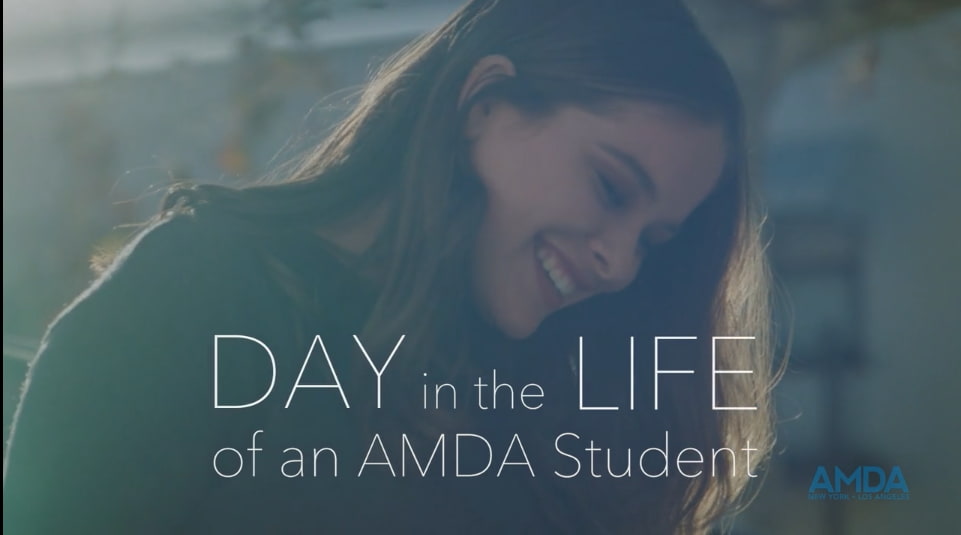Enrollment Policies
-
Registration +
Course registration occurs each semester. Only registered students may attend classes. It is the student’s responsibility to make changes to their course schedule during the appropriate time frame. Students may verify registered courses by viewing their official course schedule through the Student Portal.
Previous AMDA financial responsibilities must be met prior to registration. Students with holds on their accounts will not be able to register for classes.
Specifics regarding registration deadlines are announced by the Education Department each semester. No petitions will be allowed for late registration after the first week of the semester.-
New Student Registration
New students in all programs are automatically registered for their first semester courses by the Education Department. Students are expected to review their registered course schedule for the semester to ensure full-time enrollment status.
AOS Degree or Conservatory Certificate alumni who have been accepted to a Bachelor’s Degree Program will automatically be registered for their fifth semester courses. -
Continuing Student Registration
AMDA assumes a currently enrolled (active status) student will continue into the consecutive semester and follow the registration process guidelines. If there is a change in a student’s intent to continue enrollment for the upcoming semester, the Education Department must be notified by the 10th week of the current semester.
AOS Programs and Conservatory Programs are designed with a specific curriculum for each of the four semesters of enrollment. Each semester, active status students who are enrolled in an AOS Program, Conservatory Program or who have been approved to readmit are automatically registered for their next semester’s courses by the Education Department. However, when a particular semester offers elective course options, students are emailed to submit their elective course selection. Students who do not submit their selection are automatically registered in a course where space is available.
Bachelor’s ProgramsCourse registration information is provided to active status students during the current semester for the next semester’s registration of courses. During this preregistration time frame, students are responsible for reviewing the required and elective courses for their program as well as registering by the deadline. Required courses will be automatically registered by the Education Department. For elective courses, students self-register through the Student Portal during the registration period. Students in need of academic advisement are recommended to contact the Education Department.
Graduate ProgramsGraduate programs are designed with a specific curriculum for each of the semesters of enrollment. Each semester, active status students who are enrolled in a graduate program or who have been approved to readmit are automatically registered for their next semester’s courses by the Education Department.
Maximum Credit LoadUndergraduate students may register for a maximum of 19 credits per semester without prior approval. Students in good academic standing wishing to exceed this maximum must submit an academic plan to the Education Department and receive written approval prior to registering. Undergraduate students who register for more than 16 credits will incur additional tuition charges on a per credit basis.
-
-
Full-Time Enrollment (FTE) +
To maintain full-time enrollment status, AMDA students must be registered for a minimum of six credit hours per semester for graduate Degree Programs, 12 credit hours per semester for undergraduate Degree Programs and 24 clock hours per week for Conservatory Programs.
-
Credit Load
For graduate Degree Programs, full-time enrollment status is considered a credit load of 6 to 12 (or as prescribed) credits per semester. A credit load of three credits is considered half-time and three credits or fewer is considered less than half-time (part-time).
For undergraduate Degree Programs, full-time enrollment status is considered a credit load of 12 to 16 (or as prescribed) credits per semester. Nine to 11 credits is considered three-quarter time, six to eight credits is considered half-time and six credits or fewer is considered less than half-time (part-time). AMDA expects all students to maintain a full-time credit load for timely program completion.
Full tuition charges for the semester are applied to undergraduate students who are enrolled in 12 to 16 credits. Students who register for more than the prescribed curriculum credits will incur additional tuition charges. Prescribed credits over 16 will not incur additional tuition charges.
Undergraduate Degree program students enrolled less than full time during their course of study may not be making normal academic progress, leading to a possible delay in graduation. Undergraduate students may petition to be part-time during the Add/Drop period in Week 1. After Friday of the first week of the semester, students may only withdraw from a course, thereby maintaining the same enrollment status.
AOS and Conservatory Program students are required to register for their curriculum’s courses as prescribed and are considered full-time for each of their four semesters.
-
-
Accelerated Enrollment +
Degree Program students with 15 to 30 credits remaining toward degree completion may apply for advanced standing (accelerated enrollment). Within a student’s fifth semester, students may apply for a degree progress review to determine their eligibility for accelerated enrollment by submitting the Advanced Standing form, available through the Student Portal. An audit review will be conducted and the student will be notified. If applicable, the student’s following semester will reflect their approved classification.
-
Clock and Credit Hours +
-
Clock Hours (Conservatory Programs)
A clock hour is a measurement of one hour of scheduled, supervised instruction or studio time (class time) and a minimum of one hour per week of independent student preparation and outside rehearsal time.
-
Credit Hours (Degree Programs)
A credit hour of either a lecture- or seminar-based course represents one hour per week of scheduled class or seminar time and at least two hours of student preparation. A credit hour of a studio- or lab-based course represents two hours per week of scheduled, supervised instruction and a minimum of one hour per week of independent student preparation and outside rehearsal time.
-
-
Course Schedule +
Course schedules are made available to students before the start of the semester. Courses are typically scheduled Monday through Friday, from 8:00 a.m. to 7:00 p.m. Optional extracurricular courses, rehearsals and projects are typically held after 5:30 p.m. Students in rehearsals and productions will be expected to be available for designated weekdays and weekends according to the needs of the production or academic schedule. Only currently enrolled students, faculty and staff are permitted to attend classes, rehearsals and demonstrations.
AMDA makes every reasonable effort to offer courses as announced. However, AMDA reserves the right to modify the course schedule or to cancel courses if necessary. Students may be administratively transferred to equivalent courses. Not all courses listed in this Catalog are available each semester at all campus locations. -
Distance Education +
AMDA delivers select distance education courses via Canvas, a web-based learning management system. Online learning provides convenience and flexibility while still maintaining engagement between the student and instructor.
Within Canvas, instructors will respond to and evaluate students’ lessons, projects and demonstrations within approximately ten days of receipt or due date. AMDA maintains a record of the dates on which lessons, projects and demonstrations were received and responses were returned to each student. The first lesson and assignments will be delivered within the first seven days of the semester.
If the student has fully paid for the educational program, they can request in writing to the Education Department that all course content be provided after they have received the first lesson and initial materials. Once this request is received, AMDA will transmit all lessons and materials for the course while providing all educational services agreed upon (such as responses to student inquiries, student/instructor interaction, and evaluation and comment on lessons submitted by the student). AMDA is not obligated to refund any payment after all lessons and materials are transmitted. -
Course Add/Drop Policy (Bachelor’s Programs Only) +
The Add/Drop period occurs during the first week of the consecutive semester. Students can add or drop courses through the Student Portal within the Add/Drop period of the semester without transcript notation or financial liability. Required courses can never be dropped. Tuition charges are prorated based on a change in credit load if the credit load falls below 12 credits or is increased over the prescribed credit load offering per semester. Students are responsible for checking their total credit load per semester to ensure they are at full-time status. After the Add/Drop period, withdrawing from a course requires the Add/Drop form.
Students may register for any offered course as long as the prerequisites have been met, with the exception of dance, individual voice, vocal coaching and productions taken for credit. These classes are assigned and registered by the Education Department. Changes to levels for courses (e.g. Dance and Musicianship) may only be initiated by instructors and through departmental procedure. If a student selected a dance discipline during the course pre-registration process (e.g. ballet or jazz), dance discipline changes during the Add/Drop period may only be permitted via the Add/Drop form. All original course fees and requirements are applied to the student until an add/drop has been fully processed.
Bachelor’s Program students may withdraw from a course within the second to the 11th week of the semester by submitting the Add/Drop form. Tuition charges are unaffected. The withdrawal policy is as follows:- Week 1: Students may add or drop courses within the first five days of the semester. After Friday of the first week of the semester, students may only withdraw from a course.
- Weeks 2–11: Students who withdraw from a course during the second through the 11th week will have a “W” (Withdrawal) recorded on their official transcript record.
- After Week 11: Students who withdraw from a course after the 11th week will have a “W/F” (Withdrawal/Fail) recorded. A W/F affects the student’s GPA.
-
Course Repeats +
A course can be repeated in any program until it is successfully completed, and repeat courses will count toward program fulfillment. All grades are reflected on the academic transcript and included in the overall GPA. Financial aid eligibility may not apply for multiple repeated courses.
-
Program Change +
Students who are interested in a change of program may initiate the request by submitting the Change of Program form to the Education Department by the stated deadline. A meeting with the Education Department and/or the department chair may be required to review aspects pertaining to the new program requirements, such as audition instructions and potential enrollment extension. Although a program change may be approved, AMDA cannot guarantee course availability, which may result in a delay in graduation.
-
Semester Break +
Students who are completing an academic year may initiate a semester break by notifying the Education Department.
New York City students may request a summer semester off only if they began their program during a Fall semester. Students starting in either Spring or Summer must take four consecutive semesters with no semester break allowed.
Undergraduate Los Angeles students may request a semester break only at the end of their academic year if they plan to reenroll in the semester following the break. Late enrollment fees will apply if the request is not submitted by the stated semester deadline dates. Students taking a semester break or Summer semester off maintain an active AMDA email account where they receive all communication regarding the following semester’s registration, housing and other information.
A semester break taken during the academic year is processed as a withdrawal, as is any semester break exceeding one semester. Students in this category will need to submit a Readmission Application (available at amda.edu/registrar) for full review and evaluation. Students must be approved and cleared by all departments in order to be readmitted to AMDA. International students processed as withdrawn will have their F-1 visa status terminated and must submit a new I-20 Form application with the Readmission Application materials to reinstate their F-1 visa status.
Graduate program students may not request a semester break. -
Withdrawal +
Withdrawing from AMDA means discontinuing attendance in all courses and the program in which the student is enrolled. Students who intend to withdraw are required to meet with the following departments as part of the exit process: Student Affairs, Education Department (Registrar’s Office), Housing (if applicable), Financial Aid (if applicable) and Student Accounts. Students are to meet with the Education Department to initiate a withdrawal by completing a Change of Status form. Unofficial (administrative) withdrawals are processed by the Education Department for students who have not enrolled for their consecutive semester and have not officially communicated with AMDA.
It is important to note that students who withdraw are not automatically granted readmission. Any student whose status is withdrawn must apply for readmission (see the Readmission section).-
Administrative Withdrawal
Students who are delinquent on their student accounts, do not register or do not apply for a status change (if applicable) by the end of the semester will be administratively withdrawn from AMDA. If the student’s plans are not clarified by the end of the semester in question, the school will assume that the student has chosen to withdraw from the program. The student must respond within 14 business days of the date posted on the Withdrawal Notification letter.
AMDA may withdraw a student under the following conditions:
- Violation of Probation: Any student who is found responsible for academic or conduct violations while on probation will be withdrawn from AMDA.
- There are occasions when AMDA may determine that a student is unable to engage in the basic required activities necessary to obtain an education. Such a situation may occur when a student is unable to achieve academic progress. It may also arise when a student impedes the progress of others with their behavior. In the event that such a situation arises, AMDA will conduct an individualized assessment of the student in order to determine whether the student may remain enrolled in the program. In exigent circumstances, AMDA may take immediate measures to dismiss or withdraw a student. If such an immediate measure is necessary, the student will immediately thereafter be given an opportunity to be heard and to present their position and any additional information.
- AMDA reserves the right to request or require students to withdraw from the college and residential housing for reasons pertaining to mental or physical health when the student’s words or behavior exhibit a direct threat of harm to themselves or others or when a student’s behavior as it relates to mental or physical health significantly disrupts the ability of other students to participate in the educational programs offered by the college. Such withdrawal may include complete withdrawal from enrollment at AMDA and residential housing. AMDA further reserves the right to request that a student submit written medical clearance from a psychiatrist or applicable medical practitioner before returning to school or being allowed to live in AMDA residential housing.
AMDA acknowledges that each situation is unique to the individual circumstances and therefore will act accordingly. Readmission after such withdrawal will be on a case-by-case basis and is not guaranteed.
-
-
Leave of Absence +
An approved leave of absence (LOA) is a temporary interruption in academic attendance in an ongoing program for a specific period of time. Students must formally request an LOA with the Education Department to maintain enrollment status by completing the Change of Status form. Failure to request an LOA may result in loss of good standing with AMDA. For US citizens or permanent residents receiving Federal or private loans, funds already received by the student are to be returned to the lender, depending on the date of the student’s LOA. Federal grant awards such as FSEOG, Pell and institutional awards (e.g., AMDA scholarships) may also be decreased.
A leave of absence for up to one semester is granted to students who anticipate returning to AMDA to complete their studies. Students requesting an LOA must be in good standing and making satisfactory academic progress toward a program. Students are required to officially notify the Education Department in writing and provide supporting documentation for reinstatement prior to resuming their studies at AMDA. Students who do not return to continue their studies within one semester will be withdrawn from the program. The withdrawal date on record will be the last date of attendance.
A leave of absence must fall into one of the following categories:
-
Medical Leave
In the event that the student develops a health issue or injury that impacts attendance or class participation, the student is urged to consult with a member of the Education Department to discuss taking a medical leave of absence. Documentation from a physician or qualified medical practitioner is required for an approved medical leave of absence. Likewise, documentation from a physician or qualified medical practitioner approving the continuation of studies is also required as supporting documentation for readmission. If there is sufficient information to suggest that, as a result of physical or psychological illness, the student is engaging in or is likely to engage in behavior that could lead to injury to self or others, AMDA may place the student on a medical leave of absence for reasons of personal or community safety.
-
Family Care
If the student is presented with childcare issues, loss of a family member or unexpected medical care of family, the student may request a leave of absence. A leave of absence for family care will be granted on a case-by-case basis.
-
Military Duty
In the event the student is called to active military duty, a copy of their military orders must be provided to the Education Department to arrange for a military leave of absence. Military leave of absence is available only to students in receipt of United States military active duty orders.
-
-
Readmission +
Former AMDA students may apply for readmission in order to resume their studies at AMDA. The following steps must be taken for consideration of readmission:
- Submit Application for Readmission
- Submit Personal Statement: Students must submit a personal statement addressing the initial reasons for leaving AMDA, what the student has been doing while not enrolled and their reasons for wanting to return.
- Submit Official Transcript(s): Students must submit all applicable official transcripts for any coursework completed while away from AMDA.
- Submit Medical Statement (if applicable): If the student withdrew for medical reasons, they must provide a statement from a health care professional including detailed information regarding the status of their health as it relates to re-engaging in a rigorous curriculum and returning to normal, unrestricted activity.
Applications and all accompanying documentation must be received by the Education Department one month prior to the start of the semester. Incomplete or missing information may delay readmission.
Students will receive an official letter from the Education Department stating approval or denial of readmission following a thorough review by all applicable AMDA departments.
-
Academic Violations +
-
Academic Warnings
Academic Warning status should be taken as a serious indication of a student’s failure to comply with standards. Students who earn a GPA below 2.0 are placed on Academic Warning for the consecutive term. Financial aid eligibility is maintained during the Academic Warning term.
-
Academic Probation
During the consecutive term, failure to clear the Academic Warning status by not achieving a cumulative GPA higher than 2.0 results in Academic Probation. Students on Academic Probation risk the loss of financial aid and may be ineligible to enroll for the next term. Each probationary period pertains to the current term’s enrollment unless otherwise stated. Students may also be placed on Academic Probation without prior notice when any initial act, omission or accumulated absences or tardiness are deemed grave enough to require such action by the administration. Students in this category may appeal their status.
-
Dismissal
Students may be dismissed for reasons including, but not limited to the following:
- Failure to meet the standards of Satisfactory Academic Progress (SAP) in the program (cumulative GPA may not fall below a 2.0).
- Failure to fulfill financial obligations in any student account, including tuition and housing.
- Failure to meet AMDA’s professional standards and expectations as stated in the Catalog, including personal conduct in school and school-related facilities (e.g., housing). Appraisals of such behavior are at the discretion of AMDA staff and housing personnel.
- Failure to meet attendance standards.
- Failure to comply with AMDA’s Audition Policy.
Students residing in AMDA housing are required to vacate immediately upon dismissal.
-
Appealing Academic Dismissal
A student dismissed from a program may request reevaluation from the Education Department for reinstatement by filing a formal appeal in writing with supporting documentation. The written appeal must be received within two weeks of receipt of the notice of academic dismissal. All appeals must include the following and will be reviewed and evaluated by the Academic Committee:
- Explanation of poor performance or failure to complete required coursework.
- Description of plans to improve academic performance and complete any outstanding work.
- Any other relevant information pertaining to the student’s academic history and potential.
-
-
Enrollment Verification +
Students who are currently enrolled may request a verification of enrollment by completing the Request for Enrollment Verification form. Forms are located on the AMDA website at amda.edu/registrar and on the Student Portal.
-
Transcripts +
-
Permanent Record
Permanent records are transcripts comprising academic information pertaining to the completion of a student’s program of study.
-
Official Records
Official transcripts are issued by the Registrar’s Office by submitting the Transcript Request form. Transcripts are unable to be released to students who have outstanding obligations, financial or otherwise, to the institution. Official transcripts bear the institutional seal and the signature of the institution’s Registrar.
Students may also print unofficial transcripts through the Student Portal. -
Changes to Records
The Registrar’s Office maintains and updates student records. It is the student’s responsibility to inform the Registrar’s Office of all name, address, email and phone number changes via email or the Change of Personal Information form. The student’s legal name must be used on all official records. The Registrar’s Office requires appropriate documentation in order to change any information on an official record.
AMDA recognizes students may choose a preferred name in addition to their legal name. Students may request a preferred name be recorded in the student information system without the need for additional documentation. Preferred names may be displayed on course rosters, class schedules and internal communication. Upon request, student ID cards and student emails may also be updated. Preferred names will not be reflected on official transcripts, financial aid documentation and other areas where legal names are required. -
Retention of Academic Records
AMDA manages the retention, safety and disposal of all student records in order to be certain that the information is collected, stored and disseminated consistent with state and federal guidelines. AMDA manages all systems which contain personally identifiable information in order to ensure each individual’s right to privacy is protected, the information collected is used only for the purpose for which it was intended and every safeguard to protect that privacy has been made by each department which has access to that information. AMDA student academic records will be retained for five years after graduation or the last date of attendance. After five years, a student’s academic record will be digitized and kept in a permanent archive.
-
-
Graduation Clearance Policies +
-
Academic Evaluation
The Registrar’s Office conducts an initial and final review of each student’s academic record in accordance with graduation requirements. Students are accountable for tracking their degree or certificate status and must earn a cumulative GPA of 2.0 or above in order to be eligible for graduation. During the initial review, students who have grades of “I” (Incomplete) or “F” (Fail) on their official transcript will need to set an appointment with the Education Department during their penultimate semester to ensure those courses are resolved or planned into the final semester’s course schedule.
Following the final review, students who do not meet final academic review standards will not be considered candidates for graduation. Grades of “I” (Incomplete) or “F” (Fail) on official transcripts must be resolved prior to graduation or students will jeopardize their eligibility to graduate. Students will be notified of their deferred graduation status if curriculum requirements have not been satisfied. -
Residency Requirement
Students enrolled in the Bachelor Programs must complete a minimum of 60.0 of their degree credits in residence in order to qualify for graduation at AMDA. Courses that do not apply toward program requirements may not be used in the calculation of residency.
Students enrolled in the Master Programs must complete a minimum of 80 percent of the program’s total required credits in residence in order to qualify for graduation at AMDA. Courses that do not apply toward program requirements may not be used in the calculation of residency.
-
Financial Clearance
The Registrar’s Office must verify that students do not have any financial holds on record in order to release certificates or diplomas. It is the student’s responsibility to clear any outstanding balances or holds with the Student Accounts and Financial Aid Departments before graduation.
-
Withheld Diplomas
Students who have not fulfilled their program requirements are not considered official graduates. Nongraduates and those who have failed to settle their financial obligations will have their certificates or diplomas withheld. Students may review their account balance on the Student Portal to determine if there are any unsettled obligations that may prevent receiving their certificate or diploma. Academic records and alumni benefits (including library use, tapings and studio use) will be withheld until all academic and financial requirements have been met.
-
Graduation Procedures
Students who are candidates for graduation and are enrolled in all remaining program requirements during their last semester will be permitted to participate in commencement.
Prospective graduates must complete the Application for Graduation form during their final semester in order to apply for graduation. Students’ names are printed on their certificate or diploma as specified on the Application for Graduation form and as listed on the student’s official record. Graduates are sent their certificate or diploma three to five weeks after the ceremony (pending verification of program completion and financial standing). Students are asked to notify the Education Department of any address changes to ensure receipt of the certificate or diploma.
-
Honors Designation
AMDA Los Angeles campus students who have earned a cumulative GPA of 3.70 or higher will be listed in the commencement program as graduating with honors. The GPA is calculated at the end of the student’s penultimate semester.
-
Final Academic Review
The Registrar’s Office conducts a final review of each student’s academic record in accordance with graduation requirements. Students who do not meet final academic review standards will not be considered as candidates for graduation. Grades of “I” (Incomplete) or “F” (Fail) on official transcripts must be resolved prior to graduation. Otherwise, students jeopardize their eligibility to graduate.
Students will be notified of their deferred graduation status if curriculum requirements have not been satisfied.
-




















